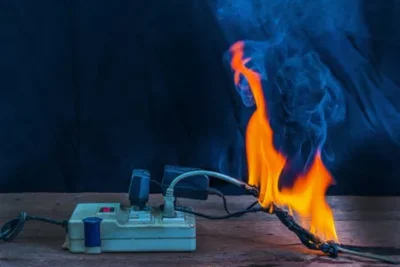Electrical fires can be dangerous and costly, and they can spread quickly. If you smell something burning, or if you notice sparks or flames coming from an electrical outlet, switch off the power before doing anything else. Most people do not know what to do with electrical fire and that is the reason I have to have my experience with you on how to put out an electrical fire.
If you have a fire extinguisher, use it as it is the best way to put out an electrical fire. Never use water because it can cause a short circuit and make things worse. The most important thing to remember when putting out an electrical fire is to stay calm.
Sometimes we panic in the face of issues like electrical fire and that will not help the situation. So, I have here some safety measures and steps to take whenever you have any issue with an electrical fire.
What is an electrical fire?
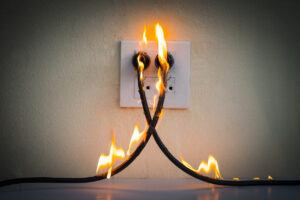
Electrical fires are one of the most common types of fires in the home, accounting for about 20% of all residential fires. Electrical fires occur when electricity from an electrical source such as a power outlet, light bulb, or extension cord contacts combustible material.
Most electrical fires begin in wiring or electrical appliances in the home. They can also start with wiring that serves an appliance, such as a refrigerator or dishwasher. Some common causes of electrical fires include:
- Improperly installed wiring
- Overloading outlets and extension cords with too many appliances plugged in
- Faulty equipment, such as overloaded circuits, shorted wires, and loose connections
- Damaged insulation on wires or cables (such as frayed wires) that touch each other and create heat when current flows through them
- Poorly maintained equipment (such as broken switches or cords)
What class is an electrical fire?
An electrical fire is a class A fire, the most common type of fire. Electrical fires occur when electrical equipment is overloaded with excess current or little protection against short-circuiting.
6 causes of electrical fires?
Electrical fires can be caused by several things, including faulty wiring, overloaded circuits, and appliances that have been damaged or improperly installed.
Electrical fires are caused by several factors, including:
1. Faulty wiring or installation
Faulty wiring or installation is one of the most common causes of electrical fires. If you’ve noticed that your lights flicker and dim when you’re using certain appliances, this could be a sign that your wiring has become faulty and needs to be replaced.
2. Damaged wiring
Damaged wiring is the leading cause of electrical fires. The most common ways that wiring can be damaged include:
- Routine wear and tear
- Overloading circuits
- Improper installation of electrical components
3. Worn insulation or insulation that has not been replaced when it becomes worn
Worn insulation or insulation that has not been replaced when it becomes worn can be a major fire hazard. Worn insulation can be the result of normal wear and tear on the wire, or it could be caused by rodent damage. Regardless of the cause, if your wires are exposed in any way, they’re at risk of starting a fire.
If you have wires that are exposed, your best bet is to call an electrician right away. The electrician will be able to check out the problem and recommend solutions based on your unique situation.
4. Damaged power cords and cables
One of the most common causes of electrical fires is damaged power cords and cables. If a power cord is damaged, it may not work properly and can cause sparks. This can lead to an electrical fire.
In addition to damaged power cords, cables can also cause electrical fires because they are often exposed to heat, which weakens them and causes them to break down over time. These broken cables can lead to short circuits in your home’s electrical system that can cause fires.
5. Overloading the circuit by plugging too many items into one outlet
Overloading the circuit by plugging too many items into one outlet is a common cause of electrical fires. You may have some devices that require a lot of power, like an air conditioner or a microwave. If you try to plug these into an outlet on their own, they will overload the circuit and cause a fire.
6. Improperly installed or damaged extension cords
One of the most common causes of electrical fires is improperly installed or damaged extension cords. Extension cords are commonly used to power temporary appliances and equipment, but improper installation can lead to overheating, which can cause a fire.
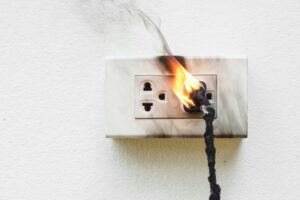
6 Symptoms of electrical fire
If you smell smoke or hear a crackling sound, there’s a chance that an electrical fire is burning in your home. Electrical fires are common, but they can be prevented if you know what to look for.
Here are some telltale signs of an electrical fire:
1. Smoke coming from outlets, lights, or switches
If you see smoke coming from a light fixture, outlet, or switch, it’s time to call an electrician. The first sign of an electrical fire is the presence of smoke. If you see any smoke coming from outlets, lights, or switches, it’s important to call an electrician immediately.
2. Sparks coming from outlets and lights
One of the signs that you may have an electrical problem is sparks coming from your outlets and lights. This can be a big deal, so check the circuit breaker to make sure all of your circuits are working properly. If you do notice sparks in your outlet, it’s best to turn off the breaker for a few hours, then turn it back on. If this doesn’t help, call an electrician immediately.
3. An unexplained burning smell in the house
If you’ve noticed a strange burning smell in your house, it could be an electrical fire. Electrical fires are most common in the kitchen and bathroom, but they can happen anywhere. They usually start with frayed or worn power cords or wires, so if you see any signs of this, get your wiring checked right away.
4. Hot wires
The most obvious symptom of an electrical fire is heats. If you see any wires that are hot or have melted, or if the electrical outlet itself is hot, you should get out of the room immediately and call 911.
5. Sizzling sounds
Sizzling sounds are one of the most common symptoms of an electrical fire. Electrical fires often present with a loud hissing or sizzling sound, which can be caused by sparks or arcing. The sound may be intermittent, which is often an indication of arcing in an electrical circuit.
If you hear this kind of noise coming from your electrical equipment, it’s important to shut off the power immediately and call a professional electrician to inspect the system.
6. Flickering lights
Flickering lights are often a sign of an electrical fire. This happens when the wires in your home’s electrical system start to break down and short circuit.
When this happens, you may notice that the lights in your home are flickering because the electricity is not staying in one place for long enough to complete its circuit. This can cause the lights to dim or flicker intermittently.
How to put out an electrical fire?
In an electrical fire, the best way to put out the flames is to turn off the power source. If you’re not sure what it is, turn off all the breakers in your home and then check for flames or sparks. If you see anything that looks like either of those things, shut everything down until you can figure out what’s going on.
Here is the right way to put out an electrical fire:
1. Unplug the appliance and turn off the power to the circuit breaker or fuse box.
To put out an electrical fire, you need to unplug the appliance and turn off the power to the circuit breaker or fuse box.
If your appliance is still plugged in and on, you could get electrocuted if you try to put out the fire. If it’s not plugged in, there won’t be any power going through it, so there won’t be anything to shock you.
2. Remove the wire from the appliance.
If you find yourself in a situation where an electrical fire has started, the most important thing to do is remove the wire from the appliance. That way, you can stop the flow of electricity to the appliance and prevent further damage from occurring.
3. Use a fire extinguisher on small fires, but only if they are not spreading quickly.
The best way to put out a small electrical fire is to use a fire extinguisher. If you don’t have one handy, you can also use baking soda, which is non-toxic and easy to find. You should never try to put out an electrical fire with water. Water will conduct electricity, which will make the fire worse.
To use a fire extinguisher:
- Pull the pin.
- Aim at the base of the fire, not at the flames.
- Squeeze the handle to release the extinguishing agent.
- If the fire does not go out after one shot from your extinguisher, leave it alone and get away from it as quickly as possible (don’t try to put it out yourself).
4. Use baking soda [If you do not have a fire extinguisher]
If you ever find yourself in the unfortunate position of having to put out an electrical fire, make sure to use baking soda if you do not have a fire extinguisher.
Baking soda is a chemical compound that can put out an electrical fire. When baking soda comes into contact with an electrical fire, it generates carbon dioxide (CO2), which is used in fire extinguishers. It also absorbs water from the air and turns it into steam, which is another way that baking soda can put out an electrical fire.
Just follow these simple steps:
- Turn off the power source that’s causing the fire. If possible, move objects away from it to keep them safe from getting burned by melted wires or any other parts of the device that might be on fire.
- Make sure there are no people or pets nearby who could get hurt by sparks flying off of your broken device or by any other part of the fire’s aftermath (like smoke).
- Get baking soda and pour it onto where your device was before you turned it off (or onto another area where there’s still smoke coming from a hotspot). You’ll need enough baking soda that covers half of what was burning before turning off the fire.
5. Call 911
If there is no way for you to stop the flow of electricity, or if it is not safe for you to approach the circuit panel or fuse box, call 911 immediately and let them know that an electrical fire has occurred.
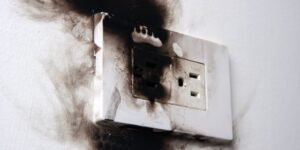
How to prevent an electrical fire from occurring
Electrical fire is a serious threat to all of us. It can occur in your home, office, or anywhere there is electricity. Electrical fires are often caused by short circuits, overheated wiring, and overloaded outlets. They can also be caused by malfunctions in the electrical system or by misuse of electrical equipment.
Here are some tips to help you prevent an electrical fire:
- Check your outlets for loose or damaged wiring. Replace any damaged wiring immediately.
- Avoid overloading outlets with too many appliances or extension cords.
- Use surge protectors on all computers, televisions, and other electronic devices that use power from an outlet. This will help prevent damage from surges that occur when lightning strikes nearby.
- Be careful about where you place your electronics. You should never put them near anything that could cause them to overheat (like a radiator), or where they could come into contact with water.
- Always unplug your electronics when they’re not in use. This will save energy, but it will also ensure that your devices don’t overheat.
- Keep an eye on your devices’ temperature levels! If a device gets too hot, turn it off immediately and let it cool down before turning it back on again.
- Always check the electric cords and wires before using your appliances.
- Never overload extension cords or power strips.
- Use a surge protector to avoid overloading your appliances.
- Keep all wires and cords away from heat sources like light fixtures, space heaters, and radiators.
Things to do if you can’t put out an electrical fire
If you can’t put out a fire, here are some things to do:
- Call 911 or the local emergency number
- Evacuate the area
- Do not use any electrical appliances, including cell phones and radios until after the fire department arrives
- If you have time, turn off all electrical circuits at their circuit breakers or fuse boxes
How do electrical fires start?
Electrical fires are caused by a few different things, but the most common is a short circuit. Short circuits occur when one part of an electrical circuit gets broken or damaged, and another part gets connected to it. This creates an unsafe electrical flow that can cause sparks and fire.
Another common cause of electrical fires is faulty wiring. Over time, wires can wear down and develop cracks or other defects that can cause them to short out and create dangerous electrical currents.
In addition to these causes, other factors can contribute to an electrical fire:
- If you overload your circuits with too many appliances or devices plugged in at once
- If you have old or outdated wiring in your home
- If you plug extension cords into an outlet or power strip without using a surge protector
What does an electrical fire smell like?
An electrical fire smells like burning plastic or rubber. It’s not uncommon for people to confuse the smell of an electrical fire with that of food burning in the oven. There are many different types of fires, and each one has its characteristic scent.
A wood fire smells like wood smoke; a grease fire smells like burnt meat; and an electrical fire smell like burning plastic or rubber.
What fire extinguisher is used for electrical fires?
A Class D fire extinguisher is used for electrical fires. Electrical fires should be treated with a Class D fire extinguisher. These extinguishers contain a dry powder that is safe to use on live electrical equipment and will not cause an arc or shock when applied.
The best fire extinguisher for electrical fires is a dry chemical extinguisher. It’s important to use a dry chemical extinguisher because water can cause electrical shock, which makes the problem worse. If you don’t have access to a dry chemical extinguisher, use a CO2 extinguisher if possible.
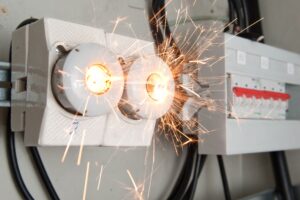
What happens if water gets in an electrical outlet?
If water gets into an electrical outlet, it can cause a lot of damage. The first thing that happens is that the water shorts out the wires. This causes the circuit breaker to trip, which stops power from flowing through the wires. This means no electricity is flowing through the outlet, so you won’t be able to plug anything into it.
But here’s where things get scary: The water will continue to flow through the wires for a few minutes after power has been cut off. So, if you touch the outlet while this is happening, you could get electrocuted.
If you see water in an electrical outlet, don’t touch it. Call an electrician right away and have them come check it out.
What is the best thing to put out an electrical fire?
The best thing to put out an electrical fire is water. Electrical fires are more common than you might think. The National Fire Protection Association (NFPA) reports that electrical fires cause an average of 8 people to die every day, and they’re the leading cause of home fire deaths.
Firefighters are trained to use water as their primary tool for putting out electrical fires because it works quickly, and can be used safely in many different locations. Several other methods can be used to put out electrical fires:
- A fire extinguisher
- A CO2 extinguisher
- Smothering (covering the flames with blankets)
What do you do if an electrical appliance catches on fire?
If an electrical appliance catches on fire, you should:
- Pull the plug from the wall. If you can’t do this, disconnect the wires from the socket and pull them out from behind the appliance.
- Call the fire department (dial 911).
- Do not use water to put out a fire caused by an electrical appliance or power line problem—this can spread the fire and make it worse. Instead, use a small fire extinguisher or baking soda to put out the flames.
Does salt put out electrical fires?
Salt does put out electrical fires. It is an abrasive material that can help you clean up your electrical fire quickly and efficiently. The salt helps loosen up the soot and ash, allowing you to easily wipe away the mess.
The reason salt works so well on electrical fires is that it conducts electricity very poorly. This means that if you get some of the salt onto the live wires while they are still sparking, they won’t be able to conduct electricity through the salt and will stop sparking.
Does baking soda put out electrical fires?
Baking soda is often used to put out small fires, but it’s not the best option for an electrical fire that is big. Baking soda does have a chemical reaction with water that makes it work as a fire extinguisher.
However, this reaction needs a lot of water to work properly, so if there’s only a little bit of baking soda in the water, it won’t be able to put out your electrical fire.
If you’re worried about something catching on fire in your home or workplace, we recommend using a fire extinguisher instead of baking soda.
Conclusion
Do you want to know how to put out an electrical fire? Then you are just in the right place. The best way to put out an electrical fire is by calling the fire department. If you’re not sure what’s causing the fire, check the circuit breaker and make sure it’s off. If that doesn’t solve the problem, call an electrician.

